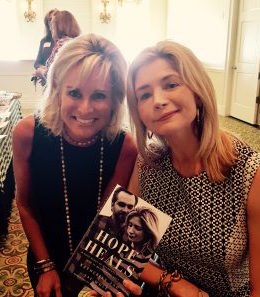(Note: This post is the last in a four-part series on praying, trusting, and waiting. Please know, as we celebrate Thanksgiving, how grateful I am for you. May you and your families be satisfied with the goodness of God.)
I marked another birthday last month, and my friend Annabelle gave me a sign:

Annabelle’s always up for fun. I’m thinking she meant the message as a party prompt, like: “Let’s have cake because it’s Tuesday.” Which is not such a bad way to live.
To me, though, the sign felt like more than a sign. It felt like a Sign. As in, it brought me face to face with the question that’s dogged me throughout this entire blog series: Is there really such a thing as the “unbroken enjoyment” of waiting? Put another way, when we feel like God’s answers are long in coming (or when we aren’t sure we’re on board with what he seems to be allowing, and maybe it even hurts) do we still have good reason to celebrate?
The answer, I think, is yes.
I’m not quite there yet, but I know some folks who are. Folks like Katherine Wolf, a stunning beauty who was just 26 years old when she suffered a massive stroke that left her unable to speak, swallow, walk, or care for her infant son. As Katherine relearned how to live, she and her husband Jay were forced to reexamine everything they believed about God. Was he truly good? Had he made a mistake? And would they still be able to look at their lives and thank God for what he had given, for what he had allowed to be taken away, and for what he had allowed to remain?

If you’ve not yet read the Wolfs’ book, Hope Heals, treat yourself to an early Christmas present and buy it here. Or watch a trailer about their story here. I can’t begin to articulate how God led this precious couple through the gap between life’s expectations and its reality (and I would hate to even try, since they tell their tale with such raw and exquisite beauty), but I will tell you this: Katherine says that pain served as her teacher, bringing her closer to Christ in a way that went beyond anything she could have imagined. For that, she was unabashedly grateful. And Jay agrees: “The call to give thanks, not at the end, but in the midst, began to reverberate inside of us.”
Giving thanks in the midst. That’s where I want to be.
And that’s basically where Andrew Murray (whose book, Waiting on God, helped launch this blog series) winds up. We may think we are just waiting for the Lord to bless us (i.e., to meet our needs and grant our desires), but the way Murray sees it, God has a higher purpose in mind: We want the gifts, but “He, the Giver, longs to give us Himself and to satisfy the soul with His goodness.”
Heady stuff. And, for those who have not yet experienced that kind of satisfaction, potentially hard to accept.
And honestly? I might be tempted to think that this whole “satisfied with God” thing is reserved for extra-holy people (people like Katherine Wolf and Andrew Murray and a handful of other “varsity” Christians you sometimes read about) except for one thing. I spent much of 2016 interviewing parents for my upcoming book, Praying the Scriptures for Your Adult Children. These folks are “normal” Christians, people just like you and me. People who prayed for their kids, took them to church, and tried to do all the “right” things in the parenting books.
But life didn’t turn out like they expected. Instead of picket-fence perfect (or even picket-fence close), these parents found themselves praying for adult children struggling with everything from getting through college to getting a job…from finding a marriage partner to navigating their way through a divorce…from battling addictions and mental health issues to surviving health crises like Katherine Wolf did.
Would these folks say they were satisfied? Would they say they had a reason to “celebrate”?
Amazingly (and almost beyond belief), they would. While none of them would wish their stories on anyone, virtually all of them told me some version of the same thing: Their challenges forced them to take their eyes off of the outcomes, because the outcomes were not always there. But the yearning for something good – something that would satisfy their deepest longings – still was. And the more they pressed in, the more they realized that their desire was not for an outcome at all.
Their desire, for themselves and for their children, was simply for Jesus.
Tomorrow is Thanksgiving. Maybe you’ll be cooking a turkey and looking out at your picket-fence yard, where your picket-fence husband (or wife!) is playing football with your picket-fence kids.
Or maybe you won’t. Maybe you’ll be looking at things like loneliness, disappointment, broken relationships, and shattered dreams. Maybe you’ll be wondering where God is, or why he’s taking so long to show up. Maybe you’ll be wondering what you have to be thankful for, or what on earth you can celebrate.
If that’s you (and I’ve been there, so I get it), then can I just encourage you to take a step back and ask yourself the same question I’ve asked myself, time and again: Are you trusting in an outcome, or are you trusting in the Lord? Do you want what God gives, or do you want him? Are you willing to celebrate…not because you have hard stuff, but because God is with you in the midst of it?
God never said he would keep us from experiencing pain, or from having to walk through hard places. Instead, he said he would walk through them with us. And when we face the death of a dream or the loss of something precious, we can do so with thanksgiving, knowing that God is in control and that he has the power to resurrect whatever it is that we have had to relinquish, making it wonderful and new in his time.
Ephesians 3:20 says that God can do “immeasurably more than all we ask or imagine.” This year, as we celebrate Thanksgiving, let’s do so knowing that our Heavenly Father is at work and that, no matter what circumstances or relationships look like right now, we can trust him to do more than we ask. Let’s thank him because he loves us in our questions, he has gone before us in our pain, and he offers us the satisfying and immeasurable gift of his presence.
Let’s celebrate. In everything.














